英汉对比与翻译(全)
- 格式:ppt
- 大小:4.60 MB
- 文档页数:82
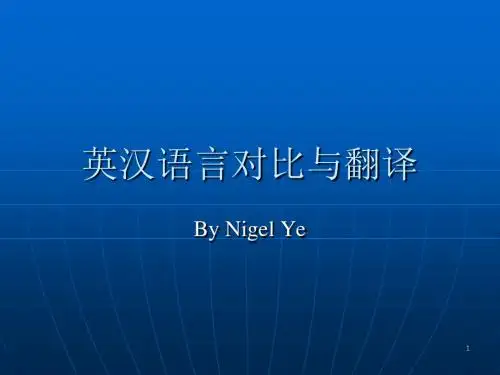
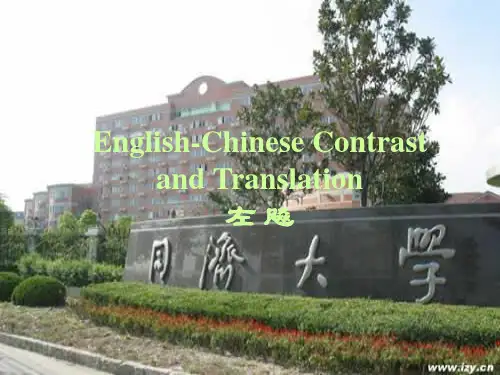
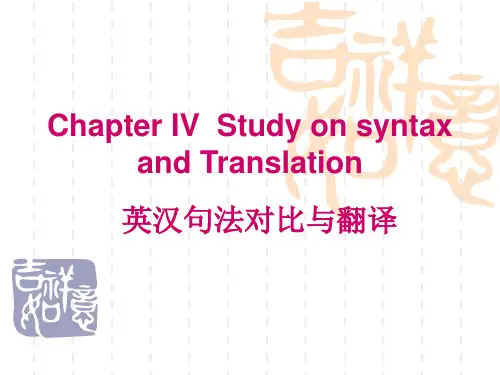
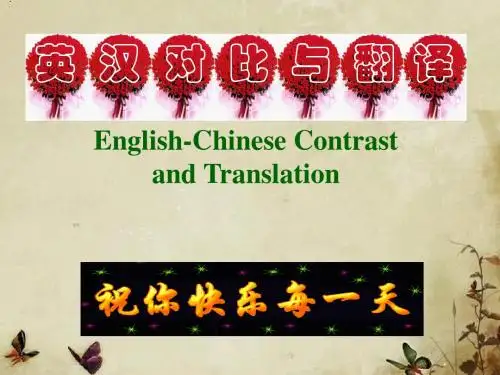
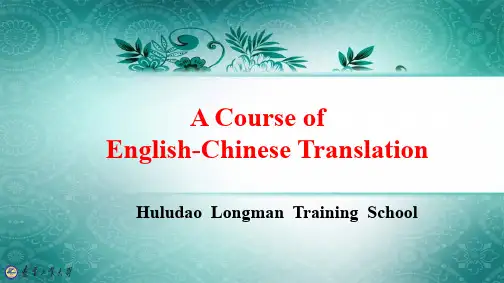

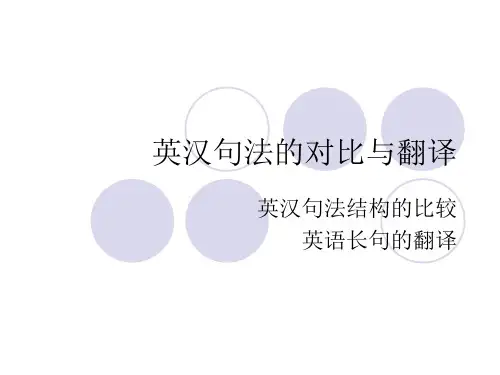
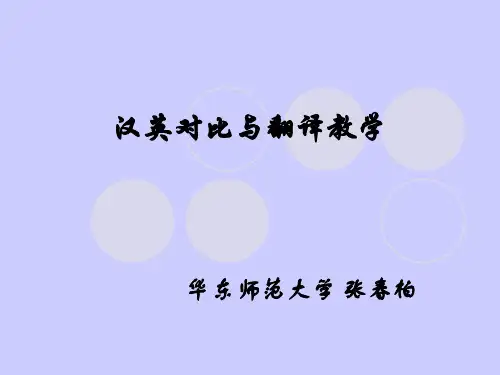
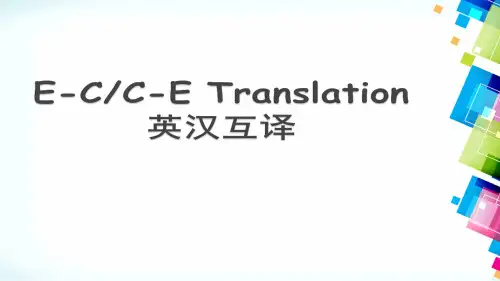
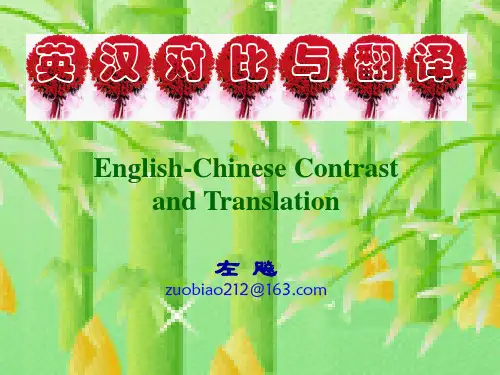
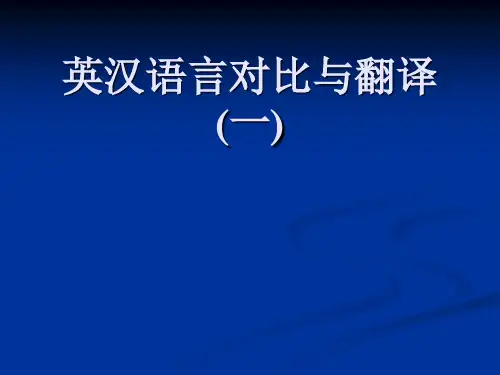
英汉语篇衔接对比与翻译【2004年8级测试汉译英】①在人际关系问题上我们不要太浪漫主义。
②人是很有趣的,往往在接触一个人时首先看到的都是他或她的优点。
③这一点颇像是在餐馆里用餐的经验。
④开始吃头盘或冷碟的时候,印象很好。
⑤吃头两个主菜时,也是赞不绝口。
⑥愈吃愈趋于冷静,吃完了这顿宴席,缺点就都找出来了。
⑦于是转喜为怒,转赞美为责备挑剔,转首肯为摇头。
⑧这是因为,第一,开始吃的时候你正处于饥饿状态,而饿了吃糠甜加蜜,饱了吃蜜也不甜。
⑨第二,你初到一个餐馆,开始举筷时有新鲜感,新盖的茅房三天香,这也可以叫做“陌生化效应”吧。
Cohesive devices 衔接手段1. reference 照应2. substitution 替代3. ellipsis 省略4. conjunction 连接5. lexical cohesion 词汇衔接----- Halliday & HasanCohesion in English重复与替代汉英两种语言的部分语篇衔接手段在使用上有所偏重,汉语更常使用原词复现和省略,而英语则更多使用照应和替代。
汉语倾向于用重复手段,而英语倾向于用替代手段。
汉语不喜欢使用同义替代的手段,因为会使精神分散;也不喜欢使用代词,因为容易变得所指不明。
结果由于强调重复,反而变成了某种意义上的“形合”。
开始吃的时候你正处在饥饿状态,而饿了吃糠甜加蜜…as you start eating you are in hunger, and when you are in hunger chaff tastes as honey…(学生译文)…as you start eating you are in hunger, when chaff tastes sweet as honey…(参考译文)他这时来了,而这时我根本想不到他会来。
He came at a time when I least expected him.那是一个寒冷潮湿的晚上,这样的晚上大部分人待在家里。
第四章英汉语言对比与翻译Fiona Ma April, 201221. 英汉语言特点2. 英汉语言特点对 翻译的启示3. 课堂互动及课后练习英汉语言对比与翻译1.英语重形合,汉语重意合2.英语偏静态,汉语偏动态3.英语重抽象,汉语重具体4.英语重物称,汉语重人称5.英语重被动,汉语重主动6.英语多替换,汉语多重复7.英语重后饰,汉语重前饰8.英语重聚焦,汉语重流散9.英语重时体,汉语轻时体1. 英汉语言特点返回章重点 4例1: Children will play with dolls equipped withpersonality chips, computers with in-built personalities will be regarded as workmates rather than tools, relaxation will be in front of smell television, and digital age will have arrived.【译文】儿童将与装有个性芯片的玩具娃娃玩耍,具有个性内置的计算机将被视为工作伙伴儿不是工具,人们将在气味电视前休闲,这时数字时代就来到了。
例2: 早知今日,何必当初?【译文】If I had known it would have come to this, I would have acted differently.1.1 英语重形合,汉语重意合1. 英汉语言特点返回章重点 5例3: As we lived near the road, we oftenhad the traveler or stranger visit us to taste our gooseberry wine, for which we had great reputation, and I confess, with the veracity of an historian that I never knew one of them to find fault with it.【译文】我们就住在路边。
英汉词语对比与翻译【打印版】英汉词语对比与翻译--- 系统、语义及其他词类在英汉语中使用的频率有差异1.我成功了。
I was in success.2. The old man cast impatient glances at the clock. 这位老师不耐烦地看了看钟。
3.他初出茅庐,没有什么经验。
He is a green hand4. On entering the door I remembered the doll I had broken.I felt my way to the hearth and picked up the pieces. I tried vainly to put them together.一进门,我就想起来了被我摔碎的娃娃。
我摸索着走到壁炉跟前,捡起了碎片。
A Contrastive Study of English and Chinese --- 英汉语对比研究人到齐就开会。
The meeting will begin when all are here. 不要人云亦云。
Don’t say what others have said.帐单撕碎了。
The bill was torn to pieces. 问题解决了。
The problem was solved.你再说一个字,我马上走。
If you should say one more word, I would go at once. 你死了,我去当和尚。
If you should die, I would go and be a monk.1.人在阵地在。
The position will not be given up so long as we are still living.(Condition 条件)2.人无远虑,必有近忧。
If one has no long-term considerations, he will find troubleat his doorstep.(Condition 条件)3.病来如山倒,病去如抽丝。